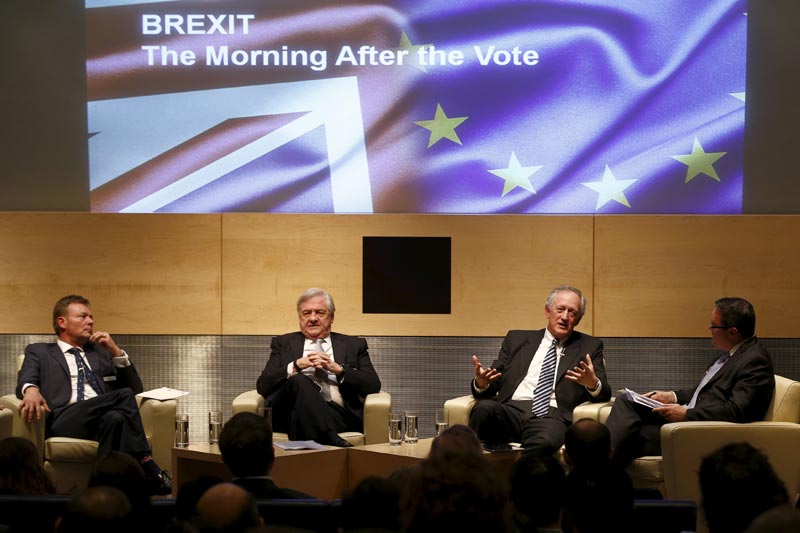-

Britain and Brixit: It will be up to British voters on June 23 to decide whether the country stays in the European Union, but international bodies and foreign leaders have joined the debate, mostly to urge the country not to the leave the bloc. Below is a summary of comments ranging from institutions such as the International Monetary Fund to China's premier. <br></br>Image Caption: Nigel Webber (2nd R) speaks in favour of leaving the EU at a Brexit debate called "The Morning After the Vote", hosted by Thomson Reuters at Clifford Chance, in London, Britain, April 25, 2016. MP Craig Mackinlay (L) and Michael Rake (2nd L) were also panel members and was mediated by Reuters Editor-at-Large, Axel Threlfall. (Reuters)
-
BREXIT AND US PRESIDENT BARACK OBAMA: Obama told Britain on April 22 that it would go to "the back of the queue" for trade talks with Washington if it left the EU. He combined the blunt warning with praise for Britain's influence within the 28-nation bloc, something Washington considered important to its own interests. U.S. Democratic presidential front-runner Hillary Clinton also wants Britain to stay in the EU. (Image Source: AP)
-
BREXIT AND US REPUBLICAN PRESIDENTIAL CANDIDATE DONALD TRUMP: The Republican front-runner for the White House said on March 24 that Britons would probably decide to leave the EU because of concerns about high levels of migration. "With the craziness that is going on with the migration, with people pouring in all over the place, I think that Britain will end up separating from the EU," he said. (Image Source: AP)
-
BREXIT AND GERMAN FINANCE MINISTER WOLFGANG SCHAEUBLE: Schaeuble said on March 3 it would be extremely difficult or even impossible for Britain to negotiate a "special deal" on trade with the EU if it left the bloc. "Imagine the negotiations that would have to take place after a Brexit decision. For the years to come all this bureaucratic stuff. Good luck!" he said. (Image Source: Reuters)
-
BREXIT AND FRENCH ECONOMY MINISTER EMMANUEL MACRON: Macron said on April 15 that Britain would need to continue to pay into the EU budget if it wished to continue with tariff-free access to the bloc's single market after a Brexit. "Those who pretend that passporting will be preserved exactly following the same rules without any contribution to the budget, are making a big, a big mistake," Macron added. (Image Source: Reuters)
-
BREXIT AND INTERNATIONAL MONETARY FUND: The global economy watchdog made an unusual incursion into a national political issue on April 12 when it said a Brexit could "do severe regional and global damage by disrupting established trading relationships." (Image Source: Reuters)
-
BREXIT AND CHINESE PREMIER XI JINPING: China, which is sensitive to comments from abroad and usually does not talk about other countries' domestic affairs, issued a veiled call on Britain to stay in the EU when its leader Xi Jinping visited the country in October. "China hopes to see a prosperous Europe and a united EU, and hopes Britain, as an important member of the EU, can play an even more positive and constructive role in promoting the deepening development of China-EU ties," he said. (Image Source: AP)
-
BREXIT AND DALLAS FEDERAL RESERVE PRESIDENT ROBERT KAPLAN: Kaplan told reporters in London that uncertainty about Brexit could affect whether the Fed raised rates for the first time since December at its June 15 meeting. He said: "There is no question that if it were to occur, it would open up potential tail risk, including the sudden or rapid depreciation of the currency which might in fact have ripple effects in other countries." (Image Source: Federal Reserve Bank of Dallas)
-
BREXIT AND SILENT SO FAR: Supporters of Britain remaining in the EU have said that a decision to split the bloc would be welcomed by Russian President Vladimir Putin as a weakening of the West. So far, Putin has not commented on the Brexit debate. "Russia is being dragged into the domestic debate on Brexit," the Russian embassy in London said in a statement in March. "Why is the 'wicked Russia' thesis used to explain a government policy?" In Brussels, European Commission economists have been banned from researching the impact of Britain leaving the bloc, or even talking about it publicly, for fear of getting embroiled in the debate, officials have said. (Image Source: AP)